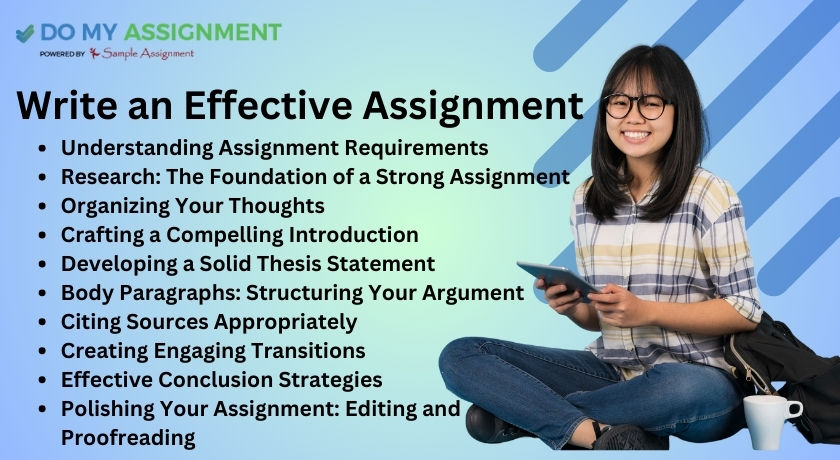How to Write an Effective Assignment: A Comprehensive Guide
- Sophie Johns12
- Jan 17, 2024
- 3 min read
Updated: Jan 20, 2024
Assignments are an integral part of academic life, requiring careful planning and execution to ensure success. Whether you're a student looking to improve your assignment-writing skills or an educator seeking insights to guide your students, this comprehensive guide will walk you through the process of crafting effective assignments. From understanding the requirements to polishing the final draft, we've got you covered.

Table of Contents
Understanding Assignment Requirements
Research: The Foundation of a Strong Assignment
Organizing Your Thoughts
Crafting a Compelling Introduction
Developing a Solid Thesis Statement
Body Paragraphs: Structuring Your Argument
Citing Sources Appropriately
Creating Engaging Transitions
Effective Conclusion Strategies
Polishing Your Assignment: Editing and Proofreading
Common Assignment Pitfalls to Avoid
Utilizing Assignment Management Tools
Ensuring Clarity and Coherence
Addressing Specific Assignment Types
The Importance of Feedback
Promoting Originality and Avoiding Plagiarism
Seeking Professional Help: Management Assignment Assistance
Do My Assignment: Tips for Success
Understanding Assignment Requirements
When tackling an assignment, the first step is to fully understand the requirements. Carefully read the prompt, noting key instructions such as word count, formatting, and specific topics to be covered.
Research: The Foundation of a Strong Assignment
Thorough research is the backbone of any successful assignment. Utilize reputable sources to gather information and ensure your content is well-informed.
Organizing Your Thoughts
Before diving into writing, organize your thoughts. Create an outline that includes key points, arguments, and supporting evidence.
Crafting a Compelling Introduction
A captivating introduction sets the tone for your assignment. Grab your reader's attention and provide a clear roadmap for what lies ahead.
Developing a Solid Thesis Statement
Your thesis statement should succinctly convey the main argument of your assignment. It serves as a guide for both you and your readers.
Body Paragraphs: Structuring Your Argument
Divide your assignment into logical paragraphs, each focusing on a specific aspect of your argument. Ensure a smooth flow from one point to the next.
Citing Sources Appropriately
Accurate citation is crucial. Use a citation style appropriate to your academic discipline, whether it's APA, MLA, or Chicago.
Creating Engaging Transitions
Transitions help maintain the flow of your assignment. Ensure smooth transitions between paragraphs and ideas to enhance readability.
Effective Conclusion Strategies
Summarize your key points and restate your thesis in the conclusion. Leave a lasting impression on your reader.
Polishing Your Assignment: Editing and Proofreading
Take the time to edit and proofread your assignment. Check for grammatical errors, clarity, and overall coherence.
Common Assignment Pitfalls to Avoid
Be aware of common pitfalls, such as lack of focus, excessive verbosity, and failure to address the prompt directly.
Utilizing Assignment Management Tools
Explore tools that can assist you in managing your assignments efficiently. From project management apps to citation generators, these tools can streamline your workflow.
Ensuring Clarity and Coherence
Clarity is key. Ensure that your assignment is coherent, with a logical flow of ideas that is easy for your audience to follow.
Addressing Specific Assignment Types
Different assignment types require different approaches. Tailor your writing style to meet the specific demands of essays, reports, or research papers.
The Importance of Feedback
Seek feedback from peers, professors, or writing centers. Constructive criticism can significantly enhance the quality of your assignments.
Promoting Originality and Avoiding Plagiarism
Maintain academic integrity by citing sources properly and avoiding plagiarism. Use plagiarism-checking tools to ensure originality.
Seeking Professional Help: Management Assignment Help
For complex management assignments, consider seeking professional help. Online services can provide valuable insights and support.
Do My Assignment: Tips for Success
If the thought of "Do my assignment" crosses your mind, follow these tips for success. From time management to seeking help when needed, these strategies can make a significant difference.
FAQs
Q1: How can I improve my assignment-writing skills?
To enhance your assignment-writing skills, focus on understanding the requirements, conducting thorough research, and seeking feedback from peers or educators.
Q2: Is it okay to use assignment help services?
While seeking assistance is acceptable, ensure that it aligns with academic integrity. Use such services as a learning aid rather than a substitute for your own efforts.
Q3: How do I avoid plagiarism in my assignments?
Avoid plagiarism by citing sources properly, using quotation marks for direct quotes, and utilizing plagiarism-checking tools before submitting your work.
Q4: Can I use assignment management tools for all types of assignments?
Yes, assignment management tools are versatile and can be adapted for various assignment types. Explore tools that suit your specific needs and workflow.
Q5: What should I do if I'm struggling with a complex management assignment?
Consider seeking professional help for complex management assignments. Online services specializing in management topics can provide valuable assistance.
In conclusion, mastering the art of writing effective assignments involves a combination of careful planning, research, and continuous improvement. Whether you're a student navigating academic challenges or an educator guiding others, these insights will serve as a valuable resource in the journey toward assignment excellence. Read Also: How is the subject of geography related to science? 7 Different Principles in Management Course

